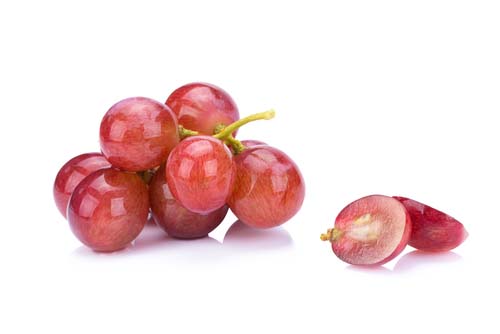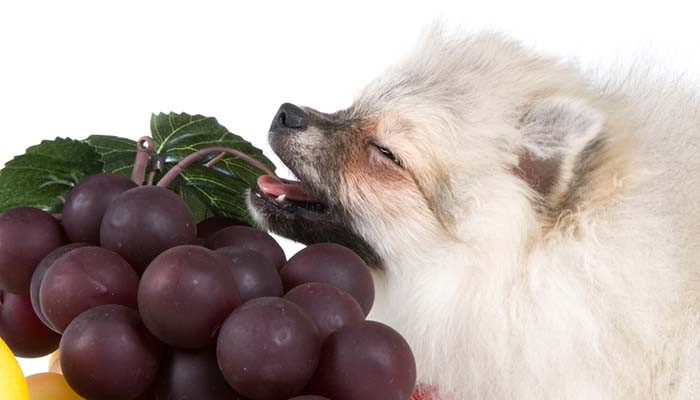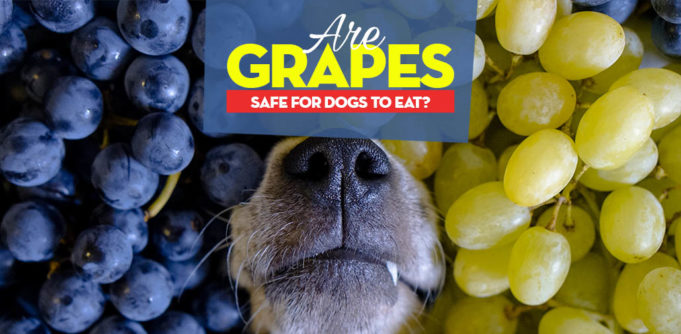Even with a high natural sugar content, grapes are a healthy snack for people. But can dogs eat grapes or raisins, and are grapes for dogs safe to consume? What about the health benefits of giving grapes to dogs, and are there any side effects? Let's take a closer look and the science on grapes.
If you've been wondering, “can I give my dog grapes,” the answer is NO – grapes are not safe for dogs to eat, not even in small amounts. Even though grapes and raisins are healthy for people, giving grapes to dogs may result in severe illnesses and even death.
The most common result of a dog ingesting grapes or raisins is kidney failure (1).
It's a sad state of affairs, because dogs love the sweet taste of grapes and this fruit is considered pretty healthy for humans to eat. So why are grapes toxic to dogs and unsafe to consume, and what could be the result of feeding grapes to your dog? Let's investigate.
Table of Contents
ALSO UNSAFE: Can Dogs Eat Macadamia Nuts?
What are grapes?
A grape are a type of sweet fruit (technically, a berry) that grows in the wild virtually worldwide and belongs to genus Vitis. Today, grapes are classified mostly as North American, French, or European.
Grapes can be eaten fresh/raw or prepared in a variety of ways. Grapes make an excellent, healthy snack for people, can be added to salads or used to make grape juice and wine.
Most common grape colors are green, black and red.
This is what fresh raw grapes look like:

Grapes have one of the highest natural sugar content of all fruits, which is why they are very sweet and tasty. Grapes are also very rich in vitamins, minerals and powerful antioxidants (2), particularly resveratrol, epicatechin, catechin and proanthocyanidins.
Unfortunately, dogs cannot eat grapes to reap those benefits, but let's discuss all these potential benefits of grapes for dogs and people, and why canines should avoid grapes.
READ: 10 Foods Dogs Should Not Eat
Grapes for Dogs 101
Can Dogs Eat Grapes?
 So can dogs eat grapes at all? No, unfortunately dogs cannot eat grapes or raisins, not even a little bit, according to several studies (1, 2, 3).
So can dogs eat grapes at all? No, unfortunately dogs cannot eat grapes or raisins, not even a little bit, according to several studies (1, 2, 3).
Even one or two grapes will cause serious health issues in dogs, some of which can be fatal to your pet, depending on how sensitive the canine is to compounds in grapes.
For people, grapes are not only fine to eat but are even recommended due to some of the health benefits they provide. In particular, antioxidants in grapes improve heart health in humans, and grape-based wine is often credited with that.
What are potential benefits of grapes in general?
There are some of the ways that technically grapes could be helpful to dogs if we would find a way to feed them without the adverse effects of grapes for dogs. In the meantime, all we currently have are studies with other animals and people:
Proanthocyanidins in grapes reduce oxidative damage and prevent heart diseases in people, according to several studies (4, 5).
Resveratrol is an antioxidant found in the grape's skin (6) that fights blood clotting, reduces risks of heart diseases, inflammation, cancer and – note this – even has been shown to prolong life in test animals (7, 8, 9).
Anthocyanins reduce inflammation and the risk of many diseases, including heart, diabetes, obesity, cancer, eye related issues and Alzheimer's (10, 11, 12, 13, 14).
Grapes are one of the best fruits (alongside apples and blueberries) to consume if you want to reduce the risk of type 2 diabetes (15).
Finally, there are tons of benefits of the most famous beverage made from grapes – wine. Many studies have shown how red wine reduces the risk of death from heart disease, lowers blood pressure, reduces risk of cancer, dementia, depression, insulin resistance and the risk of diabetes and obesity (16, 17, 18, 19, 20, 21, 22, 23, 24, 25).
With so many health benefits from grapes, raisins and red wine on the line, is there any way to feed grapes to dogs to reap those benefits? Unfortunately not that we know of, because science doesn't know much about the exact cause of toxicity of grapes for dogs.
Can dogs drink red wine?
Absolutely not (26). Not only does wine contain the same toxins that grapes do, but it also contains ethanol (alcohol). Remember that you can never give your dog alcohol, because dog's kidneys are not designed to process alcohol and it will cause serious issues.
Let's talk a little about the toxicity of grapes for dogs in general.
Which grapes in particular are toxic to dogs?
 Any fruit that falls under the definition of “grapes” will be toxic to dogs. This includes all kinds and forms of grapes which you should never give to your dog, including:
Any fruit that falls under the definition of “grapes” will be toxic to dogs. This includes all kinds and forms of grapes which you should never give to your dog, including:
- Seeded grapes
- Seedless grapes
- Commercial or home-grown grapes
- Organic or non-organic grapes
- Red or green grapes
- Raisins (dried grapes)
- Foods containing raisins or currants (trail mix, granola, bran cereal, baked goods)
- Fresh or processed grape pressings
- Grape juice, wine and other grape-based beverages
As you can see, you cannot give grapes to dogs in any form, whether it's dried grapes (raisins) or pressed grapes (juices). All of these foods and beverages will contain certain compounds from grapes that will be toxic to your dog.
But why are grapes toxic to dogs?
In truth, just like with many other toxic foods for dogs, we don't know why (1) grapes are toxic to dogs or specifically what causes illnesses and fatalities in canines when they eat it. There are speculations, however, and I discuss those below in this article.
While the cause of the toxin remains a mystery to scientists, the side effects of grape ingestion by dogs are very clearly defined. Most often, when a dog eats a grape, the result will be considerable pain, discomfort, illness and potentially – death.
Are there any benefits of grapes for dogs at all?
Unfortunately, there is no way of knowing if grapes can benefit dogs in any way, because in order to study grapes with dogs to find that out, we would need to feed grapes to dogs which may kill them or at least cause serious health problems.
Therefore, at this time, the claim is: there are no benefits of grapes for dogs.
Furthermore, the severity of the illness and damage that grapes can do to a dog’s body nullify any minor nutritional value this fruit may have for your canine.
READ: Can Dogs Eat Cherries?

What is so toxic about grapes for dogs?
Although the exact cause of toxicity of grapes for dogs is unknown, some scientists speculate that grapes are poisonous to dogs because of mycotoxins (also known as fungus) that grows on grapes and produces a toxic to dogs substance (2).
Other scientists and veterinarians feel that grapes may be toxic to dogs because they contain salicylate. Salicylate is produced naturally in grapes and it causes a decrease in blood flow to the kidneys in a canine's body due to their sensitivity to it.
What is the toxic dose of grapes for dogs?
There is no specific toxic dosage of grapes for dogs because grapes affect each canine differently (27). Some dogs are far more sensitive to grape toxins than others, and eating even one or two grapes can have disastrous consequences for these dogs.
Other dogs may be able to eat larger amounts of grapes before showing signs of toxicity.
Either way, it’s best for your dog to steer clear of grapes and all grape products entirely.
Remember that the age, size, and weight of your dog will have no bearing on how she will respond to eating grapes. This is the assumption we have to make because there is no way to predict how severely a dog may react to grape poisoning.
RELATED: Can Dogs Eat Raspberries?
4 Most Common Side Effects of Grapes on Dogs
Now that it's clear that you cannot give your dog grapes, let's discuss potential adverse effects that feeding grapes to dogs may cause and what you should do.
It’s important to note that most mild symptoms of grape poisoning in dogs don’t appear until 6-24 hours after ingestion. Severe symptoms from mycotoxin poisoning in dogs will manifest themselves approximately 24-48 hours later.
By the time symptoms in your dog reach the 24-48 hour stage, significant damage has already been done to the dog’s body without you even knowing about it (27).
Here are the side effects to look for if your dog eats grapes:
1. Gastrointestinal distress in dogs.
Grape toxin may lead to abdominal pain and loss of appetite in dogs. Some canines will experience severe vomiting and diarrhea as their bodies try to expel the grape poison.
2. Lethargy and dehydration in dogs.
These side effects tend to go hand-in-hand with gastrointestinal distress. Grape toxins will cause extreme lethargy, and frequent vomiting and diarrhea will promote dehydration in your dog; both circumstances can be dangerous.
Additional signs of dehydration in your dog are usually light colored gums, heavy panting, and dog's dry mouth and nose.
3. Tremors and weakness in the dog.
Grape toxicosis impacts a dog’s body in many different ways, often resulting in tremors and shaking, and in overall weakness in mobility of your pet.
4. Acute kidney (renal) failure.
Sudden kidney (renal) failure in your dog can lead to anuria or a lack of urine production.
Kidney failure in dogs is a veterinary emergency situation, because once anuria occurs, the dog’s life is in danger. Other symptoms of kidney failure are uremic breath, excessive thirst, nausea, diarrhea, lack of appetite, and abdominal pain.
What is the prognosis for a dog who has eaten grapes?
The prognosis for a dog who has consumed grapes or raisins depends on many factors: the amount of grapes he has eaten, amount of poisoning incurred, how soon veterinary treatment is started, and whether the dog has developed kidney failure or not (1, 28, 29).
A dog treated immediately for grape consumption and potential toxicosis often has a favorable chance for recovery. A dog that is not treated by a vet right away can quickly suffer kidney failure, after which the prognosis is poor and fatality very likely.
Roughly 50% of all dogs who eat grapes develop kidney failure.
Summary:
Can My Dog Eat Grapes?
 In conclusion, dogs cannot eat grapes or raisins, or any other grape-based product, like grape juice and especially red wine. There are no benefits of grapes for dogs.
In conclusion, dogs cannot eat grapes or raisins, or any other grape-based product, like grape juice and especially red wine. There are no benefits of grapes for dogs.
No amount of grapes is safe for dogs.
Reasons for grape toxicity in dogs are yet unknown, but scientists and veterinarians speculate that it could be mycotoxins.
The different levels of sensitivity that dogs have toward grapes and the threat to your dog’s health mean that this fruit must be kept away from your dog at all times.
If your dog ingests grapes or raisins, even a tiny amount, you must contact your vet or pet poison control immediately, because it's an emergency situation.
References
READ NEXT: What You Need to Know About Poison Prevention for Dogs














